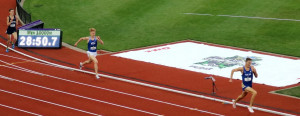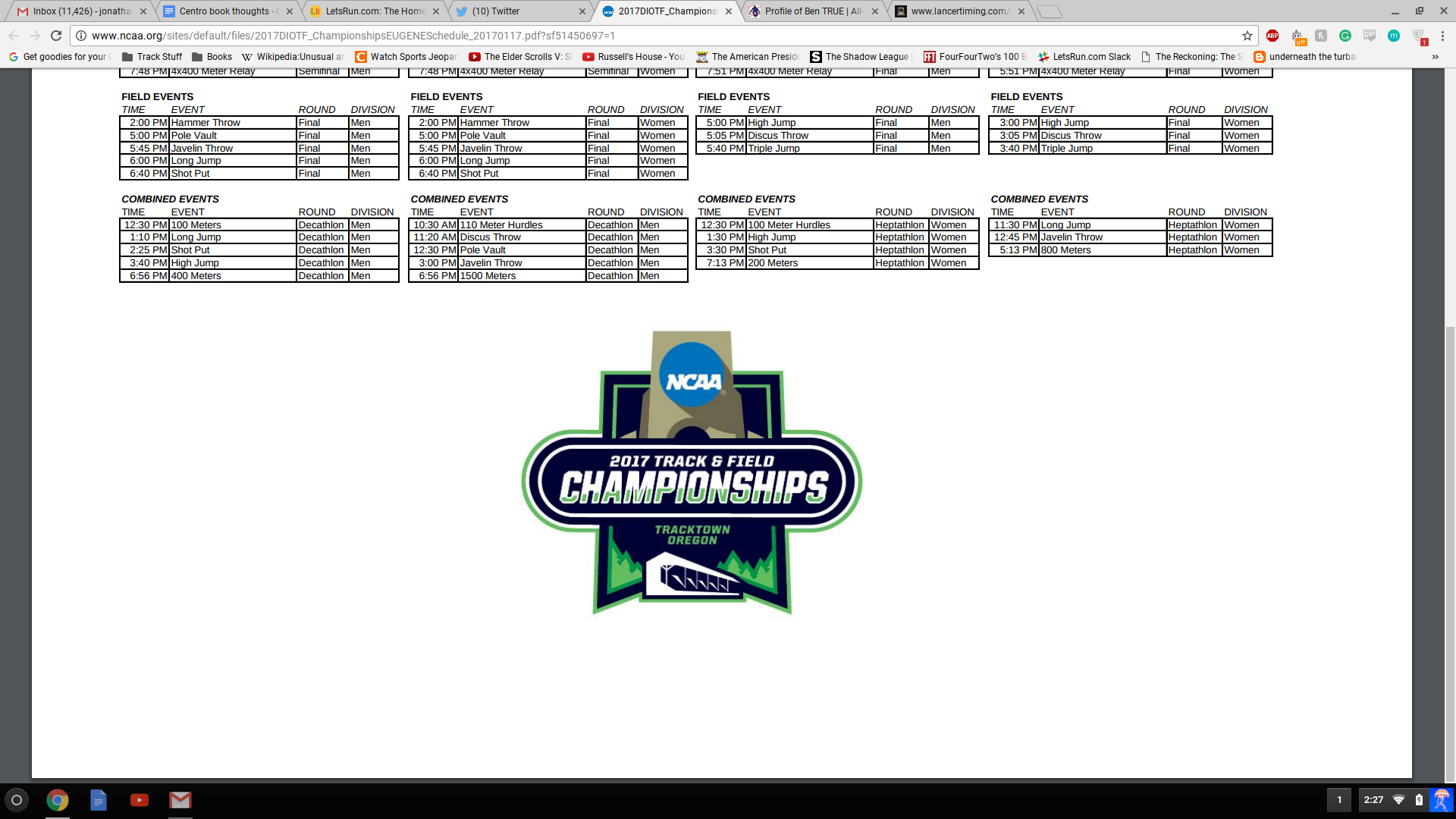RRW: After Overcoming Medical Emergency, Marc Scott Takes NCAA 10,000m Title
By Chris Lotsbom, @ChrisLotsbom
(c) 2017 Race Results Weekly, all rights reserved
EUGENE, Ore., USA (07-Jun) — Tulsa’s Marc Scott stormed to a very significant win over 10,000m here on the first day of the 2017 NCAA Division I Outdoor Track & Field Championships, drawing on a 55.44-second final lap when it mattered most. But that wasn’t the most startling fact of the Englishman’s victory: on Monday, the 23-year-old was hospitalized for 24 hours after suffering a seizure mid-training run.
 Marc Scott of the University of Tulsa (r) sprints away from BYU’s Rory Linkletter and Butler’s Erik Peterson to win the 2017 NCAA Division I 10,000m title in Eugene, Ore. (photo by Chris Lotsbom for Race Results Weekly)
Marc Scott of the University of Tulsa (r) sprints away from BYU’s Rory Linkletter and Butler’s Erik Peterson to win the 2017 NCAA Division I 10,000m title in Eugene, Ore. (photo by Chris Lotsbom for Race Results Weekly)
“I’ve waited for five years for this moment,” said a poised Scott, cracking a small smile after discussing his medical scare and emphasizing how important the moment was.
Standing on the top spot of the podium was almost in jeopardy after Scott’s seizure on Monday. Four miles into a 10-mile run here in Eugene, Scott suffered a seizure. After completing the run and consulting with team staff, Scott went to the hospital and spent a full 24 hours undergoing tests and being observed; he wasn’t released until mid-day Tuesday, roughly 30 hours before racing. He had a CT scan on his brain and an EKG on his heart, but neither test provided any concrete conclusions. Scott has suffered seizures before.
“I was always going to be on the start line unless I didn’t get the nod to go to get on the start line. If I was going to be held out, it was going to be a big shame,” he said. “I was determined to be on the start line and got the go ahead.”
After all, this may have been Scott’s best chance at an NCAA title knowing three-time reigning champion Edward Cheserek had withdrawn last month due to injury and has since signed a professional management contract. The race was conservative from the start, with the entire field passing halfway in a leisurely 14:53. Not until single digits showed on the lap counter did the race begin to progress from a jog to a tempo run, and then to a race. Eight kilometers in, still 18 men were in contention; Middle Tennessee State’s Jacob Choge was the de-facto pacemaker, leading laps ranging from 68 to 72 seconds. The yo-yo’ing was non-stop.
But when the gears started moving and 400 meters remained, it developed into a three-man race: Scott, Butler’s Erik Peterson and Samford’s Arsene Guillorel had broken from the pack. Peterson led entering the bell, but Scott let loose a kick for the ages, gapping the pair on the backstretch before hitting the Bowerman Curve.
“I had been working on that all year at the end of workouts closing really hard,” Scott mused. “I knew it would come down to the last lap… I really tried to develop the final lap.”
While Scott seemed to be running away with the win, BYU’s Rory Linkletter was stirring the exuberant crowd. In tenth position with 800 meters to go, Linkletter used his 1500m speed when it mattered most (a little known fact is that the BYU Cougar qualified for regionals in both the 1500 and 10,000m). Taking it one lap at a time, Linkletter let loose in the final circuit mowing down all but Scott down the backstretch.
Scott was simply too much to handle, and Linkletter couldn’t match the Brit’s speed. Scott would be the clear winner in 29:01.54, with Linkletter second in 29:02.96
“Five years later I’m a national champion. I’m really, really happy,” said Scott after his first national crown. With team points in mind, he’ll return on Friday for the 5000m. “This was spot on for me.”
Linkletter was overwhelmed by his finish. As a 20-year-old sophomore, in just his third 10,000m, he took second in the NCAA. Crossing the line, Linkletter brought his hands to his head in shock, a la Kim Conley after qualifying for the Olympics in 2012.
“It’s surreal. I mean I had goals of being at least first-team all-American coming off regionals. I was in ninth with about 500 to go,” he recalled, shaking his head. “I kind of just went for it, had it, and it was good. I mean, dream come true, Hayward Field, everything. It’s just magical.”
Third went to Peterson in 29:04.74 while Guillorel was fourth in 29:05.27. Navy’s Lucas Stalnaker placed fifth (29:08.81), a great showing for the Midshipman.
CRAIG ENGELS, JOSH KERR IMPRESS IN 1500M PRELIMS:
Three runners controlled the first round of the men’s 1500m: Colorado’s Ben Saarel, Ole Miss’s Craig Engels, and New Mexico’s Josh Kerr.
Saarel controlled the first heat from the gun, leading Engels and the field by a step through 800 meters in 1:59 and 1200 in 2:59. Only in the final 150 meters would Engels shift gears and effortlessly take the lead, cruising to the win in 3:40.07 after a closing lap of 55.91.
“We kind of knew Saarel would take it out, that’s the kind of runner he is. He’s strong. We banked right and just hung on to him. Very comfortable. I’m excited for Friday,” said Engels, sporting his signature mustache and mullet (all business in the front, party in the back).
Behind Engels, Oklahoma State’s Joshua Thompson was second in 3:40.12, followed by hometown favorite Blake Haney of Oregon (3:40.40), Virginia Tech’s Neil Gourley (3:40.52) and then Saarel in 3:40.71. Saarel was the final automatic qualifier; thanks to his pacing for the first 1300 meters, heat one was much faster than the second section.
Pace didn’t matter much in heat-two, as all twelve competitors were keying off Kerr, the NCAA Division I indoor mile champion. Nobody wanted to risk pushing the Scotsman too early. Kerr led the final lap and increased the pace only when he felt the field closing in on his broad shoulders. He’d win in 3:44.60 with Justine Kiprotich of Michigan State second in 3:44.74.
While he leads the NCAA form chart with a 3:35.99 1500m earlier this year, Kerr feels he is the underdog entering the final behind Engels. Kerr is well aware that the relaxed Ole Miss Rebel has a knack for success at Hayward Field: Kerr remembers Engels placing fourth in the 800m and fifth in the 1500m at the U.S. Olympic Trials last year.
“Engels can go quicker than he ran,” Kerr began. “He’s a class act and I think he can run faster than 3:37 which he has this year. I see myself as number-two to be honest. After his efforts at the Olympic Trials, you know, he’s really good. I have to respect that and am coming in for myself as the underdog because I know how good he is. I’m not levels above anyone; I’m on the same level or below so I’m just working my ass off to be number one again.”
Louisville’s Edwin Kibichiy was the fastest in the 3000m steeplechase prelims, running 8:41.07 in heat-two to defeat Georgetown’s Darren Fahy (8:41.31). Kibichiy was third here last year and is the top returner.
“I feel confident. I have worked hard throughout the year, am just here to see what happens and what unfolds,” Kibichiy said. “Coach told me to get into the finals, that’s the first thing. We started with 48 men, came down to 24 and now are down to 12. Everyone in the final has a chance to win the championship, and I am one of them.”
Fellow Kenyan Benard Keter of Texas Tech was the winner of section-one in 8:43.49, yet it was a gift of a victory. Furman’s Troy Reeder held the lead down the stretch yet slowed mightily in the final steps. Surprised by the charging crowd, Reeder was third in 8:43.57 and still advanced to the final.
Nearly all of the pre-race favorites advanced in the 800m prelims, led by UTEP freshman Michael Saruni in 1:46.38 (winning the third heat going away). Saruni’s teammate, Emmanuel Korir, won the first section in 1:46.63. Both Saruni and Korir were was also part of UTEP’s 4x400m team, last among the 24-team field.
Virginia Tech senior Drew Piazza won the second heat in 1:46.75, and expects the unexpected come the final on Friday. He’s not intimidated by the fearsome UTEP duo.
“It’s just like any other race. Be prepared for anything, try to get yourself to the front and anything can happen, so just be ready,” he said.
Of note, Olympic semi-finalist Andres Arroyo (Florida) was third in heat three, clocking 1:46.89 to advance on time. The only favorite not to advance was Middle Tennessee State’s Eliud Rutto; he was slowest of the 24 competitors in 1:50.54.
*****
Middle and long distance action continues tomorrow from Hayward Field as the women’s 10,000m will be contested, as well as prelims in the women’s 800m, 1500m, and 3000m steeplechase.








